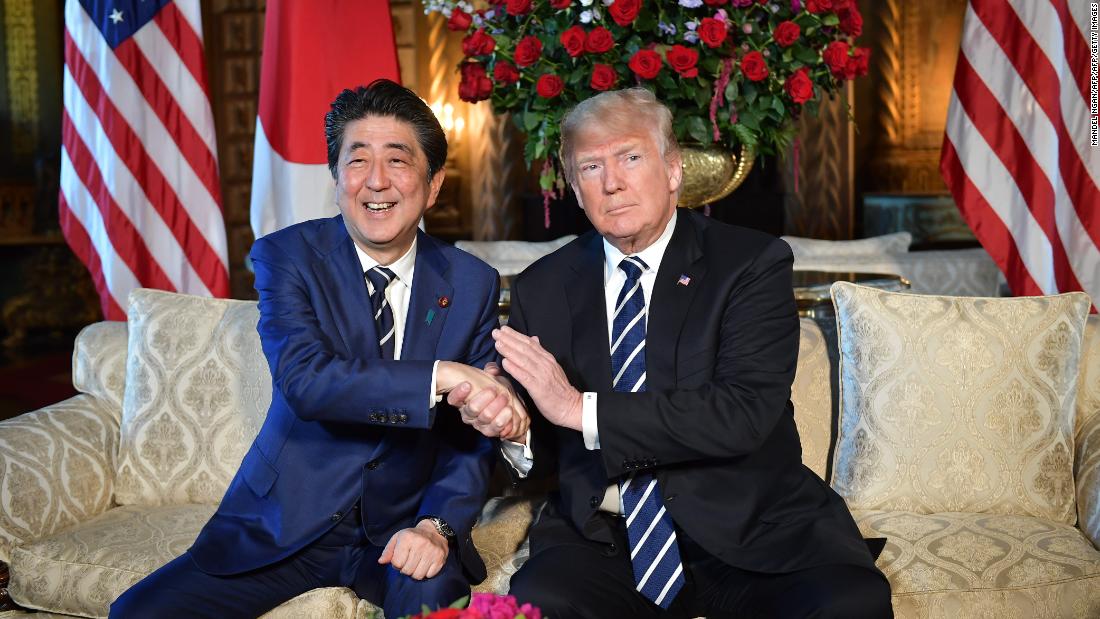Now, with Trump in Japan on Saturday for a four-day visit, Abe can justifiably say “I told you so.”
Traits that last year left him out of step with Washington — his hawkishness on North Korea and a testy relationship with Beijing — now look more attractive, with Trump facing renewed challenges from Pyongyang and seeking a counterbalance to China amid a rapidly worsening trade war.
For most of Trump’s first term, Abe has seemed like the friend who comes on too strong.
He was the first foreign leader to meet Trump after his election, flying to New York for a
sit-down at Trump Tower before the inauguration even took place. Since then, the two leaders have spoken on the phone almost 20 times, according to White House records, and met in person in both the US and Japan.
They share an affinity for golf, playing on courses in
Florida and
Saitama, and made pains to publicly
congratulate each other on “historic” election wins — even, as in Trump’s case last year,
results didn’t particularly go his way. Abe may also have
nominated Trump for the Nobel Peace Prize.
But despite an apparent bromance between the two, they have diverged massively on policy. Abe was the most hawkish of all Asian leaders on North Korea, in apparent alignment with Trump’s policy of maximum pressure against “rocket man” Kim. That is, until the US leader suddenly switched to diplomacy,
wrong-footing Tokyo and leaving Abe scrambling for his own summit that — even as Kim met with China’s Xi, South Korea’s Moon Jae-in and Russian President Vladimir Putin — is still yet to take place.
On trade too, Trump has treated Japan with more hostility than Tokyo appeared to expect,
complaining last year that the country had “hit us hard on trade for years.”
Important trip
With the twin pillars of Trump’s Asia policy wobbling and threatening to fall, the timing of his Japan trip couldn’t be better for Abe.
An expected trade deal with China dramatically fell apart this month
as Beijing appeared to push its luck with Trump, sparking an angry response and billions of dollars in extra tariffs. The rapidly expanding trade war is expected to hit US consumers hard,
leaving many businesses — including those typically supportive of Trump — bewildered and angry.
“The President of the United States owes farmers like myself some type of plan of action,” John Wesley Boyd Jr., a soybean farmer in Baskerville, Virginia,
told CNN. “Farmers were his base. They helped elect this president … and now he’s turning his back on America’s farmers when we need him the most.”
Trump will look to Japan to offer some relief on trade, or at least an easy win. Last month, the two sides held the first round of
negotiations towards a trade agreement. While Trump has spoken of a need to address the trade imbalance with Japan — a $67.7 billion deficit in 2018 — his advisers and both Republicans and Democrats have urged him to ease up on tariffs when it comes to allies and focus on China.
A trade deal with Japan that offers relief for US consumers or farmers could be a major win for Trump, and would help Washington maintain pressure on China.
Military moves
Trump may also need Japan’s support on security issues — and not just with North Korea.
Under President Moon, who more than anyone else has driven rapprochement with North Korea, Seoul is ill-placed to turn back to a position of maximum pressure if talks completely collapse. It is more likely to continue pursuing engagement in defiance of Washington, making Japan the
more important ally in the region.
In recent years, Japan has
reinterpreted its pacifist constitution — which Abe expressed a desire to rewrite completely — to allow it to come to the aid of the US militarily. Tokyo also
increased defense spending, including major deals with US arms companies.
“A united US-Japan approach to North Korea will also place more pressure on Kim Jong Un and his main benefactor, China,”
wrote international relations expert Paul Sracic for CNN recently, adding that Japan was Washington’s “most important 21st-century ally.”
Japan is also facing increased military confrontations with China over disputed islands that previously brought the two countries to the edge of conflict. In April,
Tokyo scrambled jets to intercept Chinese bombers as they flew between the Japanese islands of Okinawa and Miyako.
While Tokyo will look to Washington for support against Chinese encroachment in the East China Sea, the situation may be reversed in the South China Sea, where the US is ramping up patrols in defiance of Beijing. Tokyo has suggested it could join other countries conducting “freedom of navigation” operations in those waters, where a Japanese submarine
previously took part in drills, angering China.
During his Japan trip, Trump will also become the
first foreign leader to meet the country’s new Emperor, Naruhito. He was formally crowned on May 1,
sparking the start of the new Reiwa era.
After years of being a bit player in Trump’s Asia strategy, Abe’s investments in his relationship with the US President could finally be paying off — Reiwa may herald a renewed, stronger relationship between Washington and Tokyo.

